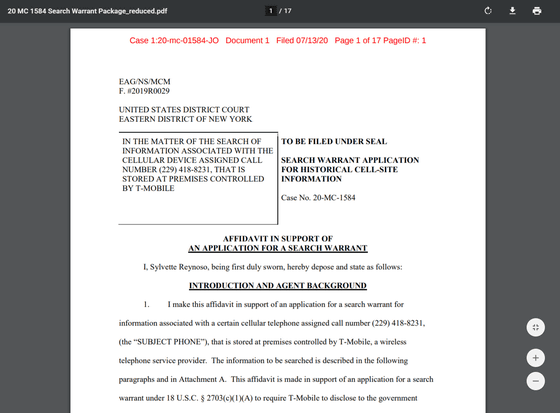It turns out that Google was sending information of 'users who searched with a specific keyword' to the police

Police officers are usually required to identify criminals before requesting an investigation warrant and collecting confidential information about the criminal. However, it turned out that Google had provided police authorities with information on the user who searched for the victim's address in response to the investigation of the case that 'a witness of the assault case was attacked'. It was revealed that police were collecting sensitive information before identifying the criminal.
Google is giving data to police based on search keywords, court docs show --CNET
https://www.cnet.com/news/google-is-giving-data-to-police-based-on-search-keywords-court-docs-show/
Google is sharing user data tied to search keywords with law enforcement | Engadget
https://www.engadget.com/google-gives-search-keyword-user-data-to-police-144249434.html
It turned out that Google was providing police authorities with information on users who searched for a specific keyword, based on a sex crime case involving musician R. Kelly . R. Kelly was a well-known R & B singer-songwriter in the United States known for ' I Believe I Can Fly, ' which won three Grammy Awards, but 20 such as child pornography, kidnapping, and forced labor. He has been charged with nearly sexual offenses and has been imprisoned in a federal prison in Chicago.
However, in June 2020, a car of a person who cooperated as a witness in the investigation of a sex crime case caused by R. Kelly was set on fire. Regarding the investigation of this arson attack, police authorities obtained an investigation warrant and requested Google to provide information on 'the user who was searching for the address of this witness at a timing close to the fire.' Google handed over the user's IP address and phone number accordingly.
The user identified by Google is Michael Williams, who lives in Valdosta, Georgia. Williams had a history of working as a spokeswoman for R. Kelly. Based on information such as the GPS movement records of Williams from the telecommunications carrier, police officials determined that Williams was highly suspected of being involved in the arson attack in question for the purpose of tampering with witnesses. Authorities have obtained a new warrant and demanded that Google submit search information for Williams and more. Google is searching not only the victim's address at the time of the incident, but also the location related to the arson attack, such as 'where you can buy a 50-caliber machine gun,' 'witness tampering case law,' and 'fertilizer bomb mechanism.' I handed over the information that it was.
The details of the series of investigations are described in the affidavit by the special agent in charge of this case.
20 MC 1584 Search Warrant Package_reduced.pdf --Another-R-Kelly-Search-Warrant.pdf
(PDF file) https://assets.documentcloud.org/documents/7222789/Another-R-Kelly-Search-Warrant.pdf

In this case, 'The people's right to ensure the security of their bodies, residences, documents and property against unreasonable searches and arrests and seizures must not be infringed. All warrants are sworn or sworn. Violation of Article 4 of the Amendment to the United States Constitution, which states that 'this shall not be issued unless it is based on reasonable grounds supported by the commitment and unless the place to be searched and the person or property to be arrested and seized is specified.' It is controversial that it may be. In one example, the Chicago Federal District Court has ruled that a 'geofence warrant' that uses location information to identify a person who was in a particular area at the time of the incident was unconstitutional.
Judgment that the investigation to 'identify all people in a specific area' using location information is unconstitutional --GIGAZINE

In response to this point, Albert Fox Khan, an expert on civil rights and privacy related to surveillance technology, said, 'It is unconstitutional if you request information for all users who searched for a specific keyword, but as in this case. It's not unconstitutional if you identify the user and then hand over the information. ' 'We request a warrant and challenge it in court if we deem it necessary,' said Richard Sargado, director of law enforcement and information security at Google. We are working on it, 'he said. He commented that he has set certain standards for responding to requests from the police and does not respond to all requests.
Related Posts:
in Web Service, Posted by darkhorse_log






